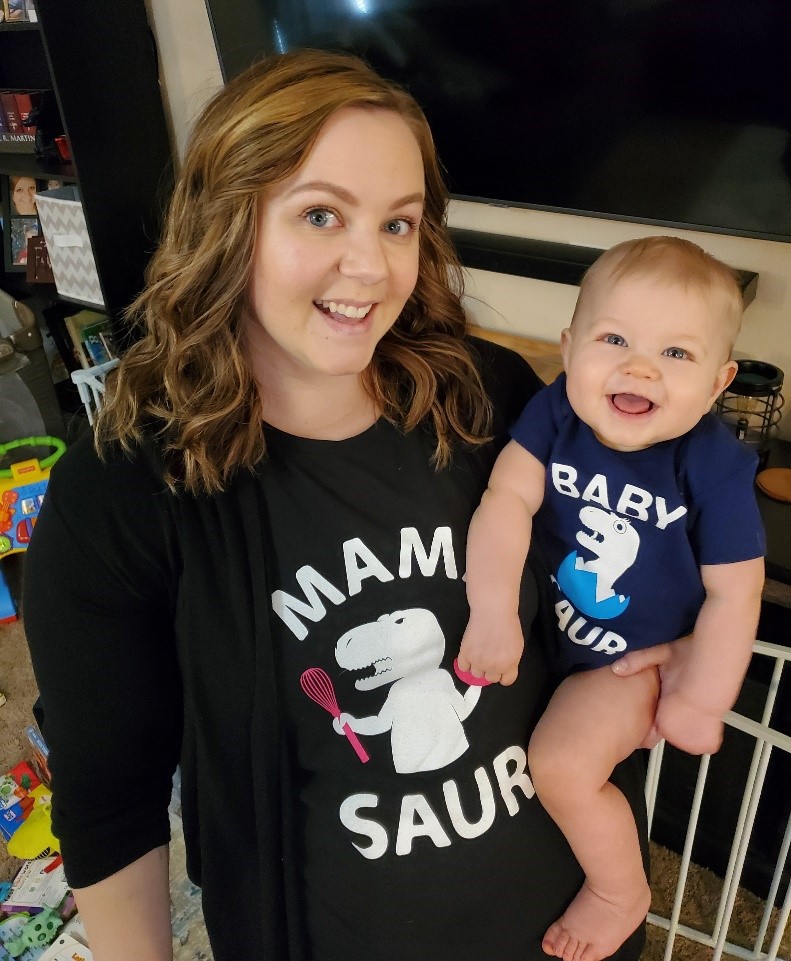The Case for Paid Leave in the United States: Brittany’s Story

Our latest report, Qualitative Paid Leave Report 2020: Furthering Our Case for Paid Leave in the United States, is based on a study we commissioned to examine how lack of paid leave affects the well-being of new mothers and their babies, particularly women working in low-wage jobs, and to amplify the experiences of low-wage working mothers in their own words. By interviewing and surveying 20 women in five states that did not require workers to have access to paid leave, we learned about how mothers navigate the experiences, demands and joys of motherhood. Brittany was one of the study participants. She offered to share her story.
—
My name is Brittany Harvey, and this is my story about navigating pregnancy and having a baby as a low-wage worker. My baby, Damon, is almost a year old now, and his sisters – my nine-year-old daughter, Aubrey, and my 11-year-old stepdaughter, Kayleigh – are the absolute best big sisters any brother could ask for. Being a mother is the greatest accomplishment of my life and I wouldn’t trade it for anything in the world. But access to paid leave complicated our family’s situation and endangered my baby’s life. Things could have been so different if Dan and I could have cared for Damon without the pressures of work and finances those first few months of Damon’s life.
We were pretty excited when we first found out I was pregnant. I had a miscarriage the year before, so Damon was our rainbow baby. My husband, Dan, and I weren’t actually trying to have a baby at the time I got pregnant with Damon, so we were not prepared financially. We didn’t have any savings, and my husband’s income working flag hours as a technician is pretty spotty. My income was the money we could count on, but as I would soon find out, my job wasn’t as understanding about my pregnancy as I hoped. If I hadn’t found a job with paid leave, we could have been facing homelessness.
Four months into my pregnancy I was diagnosed with Symphysis Pubis Dysfunction and was in pain all the time. Damon was heavy – 10 pounds when he was born! – and he sat right on my pubic bone. Some days I felt so sick I couldn’t get up, and other days I was in so much pain I couldn’t walk. I worked as a banker for most of my pregnancy, but they did not offer paid leave, and I used up all my sick time and vacation time staying in bed and going to doctors’ appointments. I knew I would need at least six weeks after Damon was born to recover and care for him, so at seven months pregnant I found a new job in the Kansas State driver’s license office, and they offered me six weeks paid maternity leave. I still can’t believe they hired me that late in my pregnancy!
 Damon ended up breached and I had a C-section. When I first came home from the hospital, I was so swollen from the anesthesia and other medications that I could not get off the couch without help, let alone take care of my brand new baby. I was already in so much pain because of my c-section, and on top of that I couldn’t walk because my legs were so swollen. Thankfully, my husband was able to get the first whole week off work. At the end of that week, still swollen and unable to care for Damon, I went to the hospital where they gave me medicine that reduced my swelling but made my breast milk dry up. If my husband could have stayed home a little longer, the swelling would probably have gone down on its own, and I could have breastfed my baby. Breastfeeding is healthier, cheaper and easier. I cried a lot after that, because I’m his mother and I’m supposed to provide that for him, and I couldn’t. But I didn’t have a choice.
Damon ended up breached and I had a C-section. When I first came home from the hospital, I was so swollen from the anesthesia and other medications that I could not get off the couch without help, let alone take care of my brand new baby. I was already in so much pain because of my c-section, and on top of that I couldn’t walk because my legs were so swollen. Thankfully, my husband was able to get the first whole week off work. At the end of that week, still swollen and unable to care for Damon, I went to the hospital where they gave me medicine that reduced my swelling but made my breast milk dry up. If my husband could have stayed home a little longer, the swelling would probably have gone down on its own, and I could have breastfed my baby. Breastfeeding is healthier, cheaper and easier. I cried a lot after that, because I’m his mother and I’m supposed to provide that for him, and I couldn’t. But I didn’t have a choice.
When I went back to work, I found a daycare in my neighborhood run by the mom of my daughter’s friend. My daughter was four years old when she told me about the abuse that was happening at her daycare, so I was happy to find someone I could trust to care for Damon. Everything was fine, we thought. But then Damon’s doctor said he wasn’t gaining weight. Damon was spitting up a lot, so we changed formulas and put him on medicine, which helped tremendously. Three weeks after he started taking the medicine, COVID happened, so he stayed home with us. A month later, his doctor said he was back on track. When I went back to work Damon went back to daycare, and every time I’d hand him to the daycare provider he would cry and scream. When I would feed him dinner, he’d eat it savagely. My gut told me something was wrong, so I put in my two weeks at my job, and I took Damon out of daycare. When Dan picked up Damon’s stuff, he looked inside the can of formula that we had given the daycare provider at least a month before, and it was barely touched. We think she wasn’t feeding him because he was spitting up, and maybe because he wasn’t holding his own bottle and she didn’t have time to sit with him while he ate. Whatever the reason, Damon had been starving, and if it weren’t for a pandemic that forced us all home, we may never have known.
Today Damon and I are doing great. I still have pubic pain if I sit down for too long or exercise too much, but if I stretch and move around, it doesn’t hurt as bad anymore. During my final two weeks of work, I figured out a way to pay off our credit cards by getting a debt consolidation loan. Not paying for daycare also helps, and I’m working as a driver for Door Dash to generate some extra income. It’s less money than I was making, so our finances are very questionable. We are taking it one day at a time. I’m grateful for the paid leave I had, but I think, realistically, women need at least eight weeks, and that’s with a natural birth without complications. With Damon, I struggled to take care of him for two full months after my C-section. More paid time off work, for both my husband and me, would have made a world of difference in caring for Damon, especially being able to breastfeed him and ensure he was getting the food he needed.
 I’m so thankful and blessed to have the ability to stay home with Damon now. Still, living paycheck to paycheck, not knowing if my husband’s income will be enough to cover the bills, is incredibly stressful. In an ideal world, paid leave would last at least three years, long enough for my child to have the ability to tell me about what’s going on in daycare. Without more paid leave, my options are to get a full-time job to relieve financial stress and put my baby in daycare where he could be harmed and can’t advocate for himself, or stay home and know he is well cared for but struggle to pay bills. Being a parent shouldn’t have to be like this.
I’m so thankful and blessed to have the ability to stay home with Damon now. Still, living paycheck to paycheck, not knowing if my husband’s income will be enough to cover the bills, is incredibly stressful. In an ideal world, paid leave would last at least three years, long enough for my child to have the ability to tell me about what’s going on in daycare. Without more paid leave, my options are to get a full-time job to relieve financial stress and put my baby in daycare where he could be harmed and can’t advocate for himself, or stay home and know he is well cared for but struggle to pay bills. Being a parent shouldn’t have to be like this.
For more about the report, our work with paid leave and how you can help, visit here.
